How legally I remove my son's paternal surname?
In just two decades in Mexico, divorces in the country increased 182 percent, that is, between 2010 and 2017, a total of 910 thousand 361 couples divorced, a figure that contrasts with the 688 thousand 680 cases registered between 2000 and 2010, according to figures from the National Institute of Statistics and Geography (Inegi).
While the 2010 Population and Housing Census reported that in four out of 10 Mexican households there is an absent biological father, this means that there are 11.4 million children who did not have a biological father figure in their childhood, and in many cases, in any aspect of life.
Such situations can cause many children to grow up with a negative feeling towards their paternal surname, or even, that their mothers, by continuing with their lives, seek to sue for the legal discharge of the biological father, or that the children grow up with a new family, with grandparents, among a long etcetera, and they end up looking for the possibility of eliminating any trace of the father's biological surname.
(Photo: @spantax/ Unsplash).
Recently, a resolution in the Judiciary in the State of Mexico demonstrated at the national level that the change of surnames due to the abandonment of children during their childhood is a reality.
Astrid Lorena Avilés Villena, was the judge who handed down said sentence, for two children to modify their birth certificate and change their biological father's surname to that of their mother's partner.
Based on international laws on Human Rights such as the Universal Declaration, the International Covenant on Civil and Political Rights, as well as the American Convention on Human Rights, the judge indicated that "the fundamental right of the name, as an attribute of personality, is closely linked to a person's right to identity, which places them as an integral part of a family structure, in which they play a role and therefore speaks of the social reality in which they operate".

“As a judge, I saw that the children rejected the father's surname, it is important that judges value this human situation, have empathy to know the needs of the acts, and all parties agreed with the sentence”, He recalled, after mentioning that the process that began in June and ended in October 2019.
Avilés Villena, first instance judge, and currently head of the General Secretariat of Agreements of the Mexican Judiciary, expressed in an interview with Cultura Colectiva News that the viralization of her work, after the publication in the media with the note titled "Children surnames are removed from the biological father because he abandoned them when they were little", gave him professional satisfaction for attending to the needs of the public.
“You have to feel, to put it in some way, these types of resolutions, so that more and more judges dare to meet an objective, which is respect for the fundamental rights and guarantees of all individuals,” he said by telephone from Toluca, State of Mexico.
Judge Avilés Villena explained that the process for changing surnames is an issue that, for each judge, will be different because they have to analyze whether the particular case merits a resolution.
“It is a contentious procedure, it has all the bases that are provided for in the civil procedure code, the issuance of the sentence in no way depends on the procedural conduct of the defendant, it depends on the analysis that the judge performs to determine Yes, indeed, the assumption of the modification of the minutes occurs, ”he said.
(Photo: @daiga_ellaby/ Unsplash)
FIRST STEP.- To eliminate the surname of the biological father and modify the birth certificate, at least in the State of Mexico, it begins by hiring a private lawyer - who charges his fees professionally and his costs may vary - or, you can even access a public defender litigant.
In the State of Mexico, people who do not have the solvency to pay for a lawyer have the possibility of attending the public defender's office, where the State is in charge of providing legal support for free.
Then, the Mexican civil code has guidelines to generate the modification of the birth certificate, which in the particular case are provided for in articles 3.38, and 3.38 bis.
Through a lawsuit to change surnames, certain requirements must be met (to name a few):
However, Judge Avilés Villena insisted that each case is particular and unique. "We cannot generalize that all petitions will be favorable to modify the minutes, you would have to analyze each of the issues in a particular way, each case has to be valued, both for minors, and in the case of adults where I dictated judgment," he said.
The process, in which the judge participated, lasted at least five months, and all the procedures in the Judiciary of the State of Mexico are free, and advice and training are even offered so that the judges defend the meaning of the users , which guarantee, respect and ensure human rights, based on the constitutional reform of June 10, 2011, and are obliged to attend to this type of social resolutions, indicated the judge.
The only costs, Avilés asserted, are found in the issuance of certified copies in the Civil Registry, and he invited the people interested in starting said trial, they can go to the page of the Judiciary and the Family Chambers of said institution in the State of Mexico.
(@Judebeck/ Unsplash).
In figures from the National Occupation and Employment Survey (ENOE), in 2014, they revealed that 33 out of every 100 women, from 15 to 54 years of age, are single mothers, in addition, in 2017, there was an increase of 21.2 percent in the index of women who exercise maternity without being attached to any partner.
The ENOE, in 2017, also indicated that 97 percent of all single women between the ages of 15 and 19 have only one child, those between the ages of 40 and 44, who represent 32 percent, have two children, and women from 50 to 54 years old, that is, 38.5 percent, conceived three or more children in their lives.
Also, the Supreme Court of Justice of the Nation (SCJN) ruled in favor of allowing children to choose their last names.
In August 2019, it resolved that in a case of acknowledgment of paternity and retroactive maintenance payment, the minor must be heard to determine the order of the surnames that will bear his name.
In the First Chamber session, the SCJN established that the payment of retroactive alimony in favor of a girl, boy or adolescent, unlike alimony, must be set in a liquid amount and not in a percentage, which guarantees in a broader and more comprehensive way the child's right to support and gives legal certainty and security, both to the debtor and to the support creditor.
In this sense, the judge must assess the evidence and take into account different issues that allow setting an adequate amount, since the quantification requires certain elements of conviction and analysis of particular conditions.
For them, the judge must attend to the elements that have traditionally served as a frame of reference for determination, that is, the economic capacity of the debtor and the need of the alimony creditor, assuming that because he is a minor, the presumption of necessity.
This implies that if necessary, the judge must ex officio collect the necessary evidence so that the amount is proportional.
Of particular relevance was the determination regarding respect for the right of the minor involved in the paternity acknowledgment controversy, in the sense of giving him the opportunity to express his opinion regarding the change of surnames and guaranteeing that his right to the identity. In this way, if in the case, the child was in school and in the different areas of his life he had used his mother's surname, without having had a personal relationship with his father, it is not reasonable to determine that the child goes first. father's last name and then the mother's.
______________________________
* Cover photo: @guillaumedegermain/ Unsplash.
You might be interested in:
You can be unfaithful in your marriage and not pay moral damages: SCJN
Mothers would lose custody for not letting parents see their children: SCJN
Children remove their biological father's last name because he abandoned them when they were little







